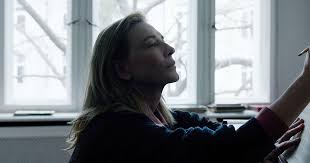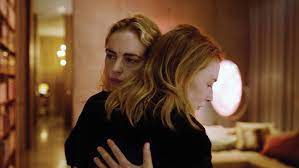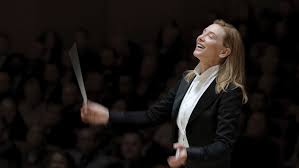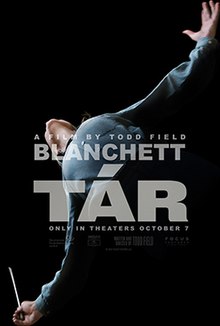**I will discuss certain plot points of Tar, but I will make sure to include Spoiler Warnings when the time comes**
Not every filmmaker has a desire to churn out a new film every year...or every other year...or every five years. Terrence Malick had a gap of 20 years between Days of Heaven and The Thin Red Line...and Todd Field came close with his latest effort.
Todd Field's Tar is his first film in 16 years following Little Children...and even that film was his first in five years following In the Bedroom.
In the Bedroom got Best Picture, Screenplay, and acting bids while Little Children managed to get acting and screenplay nominations, so his small track record does show promise.
As of this review, Tar is on track to get a Best Picture nomination and its star, Cate Blanchett, is an early frontrunner to win what would be her 3rd Oscar, putting her in prestigious company with the likes of Meryl Streep and Ingrid Bergman.
When looking at a movie like Tar, the trailer left me immensely intrigued.
It showed enough to pull you in based on very stark images and a certain palpable intensity. All of the released plot descriptions talked about how this was a film that would show the downfall of a well-respected and world-renowned composer/conductor...but that was it...not much else was said otherwise.
A fictional character, Lydia Tar (Cate Blanchett) has basically had a staggering career that one could hope to achieve in her field. She is a member of the elite EGOT club, and she conducted with many prominent orchestras within the US such as Cleveland, Philadelphia, Boston, and New York.
She is now the first female conductor of the Berlin Philharmonic.
Using the method of a having her accomplishments listed via an interview intro by Adam Gopnik of The New Yorker, we know right out of the gate that this is a woman who has achieved great success...even if it does come across as a massive avalanche of exposition being thrown at us.
And now, as what she will consider the capstone of her career, she has announced that she will be conducting Mahler's 5th Symphony.
We also meet two very key women who are a part of Lydia's life:
Her assistant Francesca, played by the lovely Naomie Merlant from Portrait of a Lady on Fire and Sharon (played by German actress Nina Hoss), who is a concertmaster who also just so happens to be Lydia's wife.
So yes, Lydia Tar is a lesbian...or as she calls herself, "a U-Haul Lesbian", which she brings up during a guest lecture at Julliard while she was in town for The New Yorker Festival.
The lecture seems to be going very well, but she seems to take a particular interest in Max, who identifies as "a BIPOC pangender". At first, they seem to have a sort of mutual admiration, but it slowly dissipates when Max has a rather negative opinion on composer Johann Sebastian Bach. While sitting on a piano bench with Lydia, Max's leg bounces up and down as a tic which is noticeable throughout the whole scene. Max's leg bounces as he proclaims he would never want to conduct any music written by white cis men who were said to be purely misogynist, like Bach. Before she says her retort, she
slams her hand on his leg to get him to stop and proceeds to delicately belittle him.
Despite Lydia being a member of the LGBTQ+ community...not to mention being a woman in a very prominent role...she doesn't seem to want to play into the idea of identity politics. This leads Max to call her a bitch and he leaves the lecture.
She calmly accosts him on the way out and proclaims: "If you want to dance the mass, you must serve the composer".
And that is a line that echos throughout the film, except Lydia might view it as certain people must serve try to serve the conductor.
Let's get into SPOILER TERRITORY now:
The film's treatment on the ideas of identity politics and cancel culture has made some people angry, with perhaps the most prominent example coming from, ironically enough, The New Yorker.
In his review from the magazine, Richard Brody deemed Tar as a regressive film.
His main points were:
"It is a regressive film that takes a bitter aim at so-called cancel culture and lampoons so-called identity politics" while going on to accuse the film of "conservative button-pushing" that gives the film a truly dire aesthetic.
Lydia Tar does get "canceled" as it is discovered that she often used her clout to help women in exchange for sexual favors.
Things become truly tense when it is discovered that a young woman named Krista, who was trying so desperately to remain within Lydia's world, commits suicide and pens a damning note that basically incriminates Lydia in her heinous actions.
Lydia asks Francesca to please delete any correspondence to show that Lydia may have had a questionable relationship or even much interaction in general with Krista.
In one scene, Lydia suspects that Francesca didn't do as she asked and ends up sneaking onto her email and finding that she never did.
From here, the movie descends into making sure Lydia Tar will be destroyed...or rather "canceled".
What about the accusations though? How much of this affects the film?
Well, I am going to turn to Richard Brody again for this:
"The movie scoots rapidly by the accusations that she faces; it blurs the details, eliminates the narratives, merely sketches hearings, leaves crucial events offscreen, and offers a calculated measure of doubt, in order to present her accusers as unhinged and hysterical and the protesters gathered against her as frantic and goofy. Moreover, it depicts her as the victim of another attack, one that is based on blatant falsehoods, but that, in the wake of the other accusations, gains traction in the media."
Here is where I start to waffle on my own opinions...because unlike Brody, I am not necessarily sure that Lydia is presented as a victim. Although, I do agree that the film does sort of breeze by certain developments that I personally feel would've given a stronger structural core.
Then again, this is also what can be so wonderful about film analysis/criticism. Brody sees the film as one way while I am not entirely sure I agree with all of his sentiments.
Do I think Lydia is portrayed as a victim?
This is where I am inclined to want to watch the movie again and try my best to overthink the opinions of others and take away what I feel the film is giving us.
My first inclination is, actually, no. I don't think she is a victim...but if the film makes me have an inkling of sympathy for her, it is simply because Cate Blanchett is just that compelling an actress.
As it stands though, I think some "cancel culture" IS problematic and can be rather conservative in its own subversive way...but despite the limited scope shown of the accusations towards Lydia, we seem to get that she used her clout to target women she wanted to sleep with. That's enough for me to make me view her as someone who has issues and deserves comeuppance.
And she gets that comeuppance.
Her wife Sharon leaves her and she takes their adopted daughter Petra with her. In one scene, we watch Lydia try to intervene to talk to Petra as she leaves school but Sharon rushes in to pull her away. She is cutting Lydia entirely out of their lives and Lydia begs "Please don't do this!"
However, I didn't view the moment as the film sympathizing with her. I think it was a case of me appreciating the layers that Blanchett was able to add to the scene...and if anything, I sort of liked watching this blow up in her face because Sharon was right in her own actions of feeling truly betrayed by Lydia.
Although, one moment of the film, which is presented as uncomfortably funny/awkward, might be my favorite acted moment of Blanchett's career.
Lydia opens the door to find the adult children of her neighbor who passed away...they are looking to sell her apartment. Lydia is still in despair from her life but does show remorse to them at first. They mention the loud music playing, which Lydia assumes they were complimenting, and she proceeds to shut the door. Instead, they stop her and ask if they can try to figure out the time frame of which she'd be playing music because they'd want potential clients to come when she is NOT playing music.
Lydia, with music being her life, is baffled. This is the only thing she has so she almost instantly starts to tear up while also mockingly laughing at the group at what is seemingly their poor taste. She just says "Oh, we wouldn't that!" while shutting the door in their faces.
We then cut to a quiet shot of her apartment and then she suddenly appears scream singing while playing an accordion "Apartment for sale! Your mother is buried!" among other relatively inappropriate phrases.
Blanchett is a master. While having a history with music such as playing the piano, she studying to learn how to conduct and the skills to make it convincing. Watching her conduct in this movie has the same sort of intensity similar to that watching Ed Harris paint in Pollock.
Her energy, even when it is at its most subtle, is rather ferocious. We do get those moments where the lion within in her comes out, such as when she attacks her former protégé Eliot (Mark Strong) as he prepares to conduct Mahler's symphony in her stead...or the previously mentioned scream singing of "Apartment for sale!".
Blanchett manages to make this woman a truly compelling character and while she is someone I am sure I would never want to meet in reality, I was fascinated to watch her onscreen.
Going back to the film itself...
At the end of the film, we see that Lydia has managed to find a way to maintain working but perhaps not in the most glamorous of locales. She is now conducting the score for a video game in front of an entire auditorium filled with cosplayers.
People have debated what exactly Todd Field was trying to go for here...especially considering the name of the video game is Monster Hunter.
Some feel that the message is saying that perhaps the idea of "hunting" down and cancelling famous people is just as horrible an act in its own right...as if we are depriving society of a great artist.
Some have viewed it as just an ironic way to show that Lydia has fallen and the heroic act of the people who brought her down puts her right in line with the monster within the game.
I was more inclined to view it with the latter...but then again, I think I want to view the movie a second time.
If I were to watch it again and have a different opinion, I will follow up for sure.
As it stands, my immediate reaction to the film was positive though not as rapturous as some. I do agree with Richard Brody that the film does gloss over details that could've made the "incriminating accusations" portion have more weight...but beyond that, I do get the sense that I need more time to ruminate. I just wanted to get some thoughts out there first.
If anything though, see the film for Blanchett. She is worth the effort!












No comments:
Post a Comment